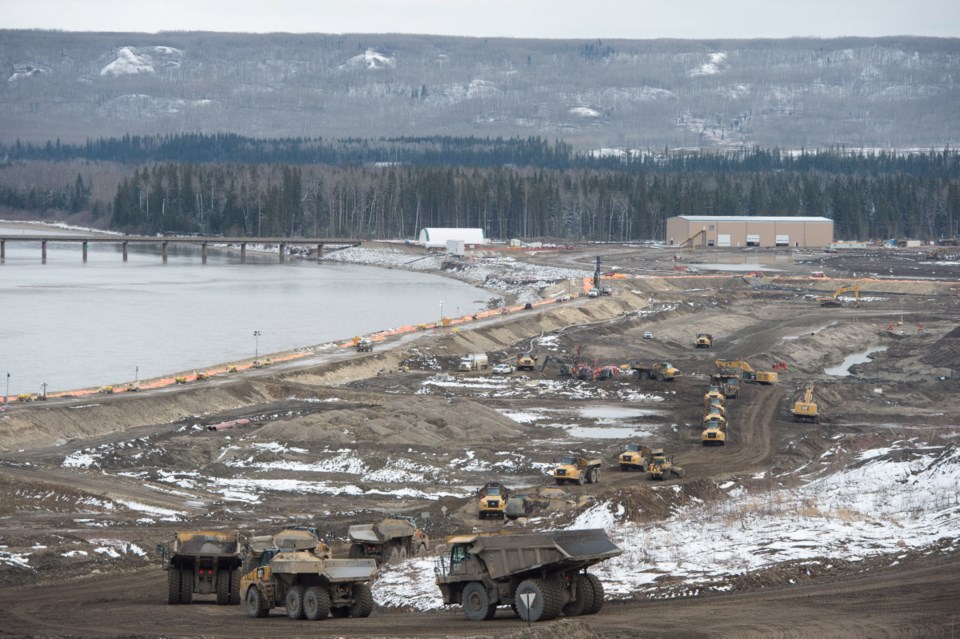B.C. Hydro says it will miss a critical river-diversion milestone in the Site C dam construction, adding an estimated $610 million to the controversial project’s budget.
The information comes at a crucial time, as the province is deciding whether to continue, halt or shelve the now $9.4-billion hydroelectric project.
B.C. Hydro had previously said the project was on time and on budget, but changed its tune in a new submission to the B.C. Utilities Commission.
The BCUC is reviewing the economic viability of the project at the request of the province.
“Following a meeting on Sept. 27, 2017, between senior executives of B.C. Hydro and the Main Civil Works contractor, the parties determined that river diversion is not achievable in 2019 and would be postponed until 2020,” the Oct. 4 submission says.
If the September 2019 milestone is not met, river diversion must be delayed by one year, since it can occur only during a one-month window when river flow is at a low.
However, the delayed river diversion won’t stop the overall project from delivering power by its November 2024 deadline, because B.C. Hydro built a “one-year float” into its plans, it says.
The delay was largely prompted by two “tension cracks” that appeared in February and May, delaying construction on the left bank of the river.
Tension cracks are cracks that appear on the surface of a soil mass, especially on a failing slope.
When the 400-metre February crack appeared during construction of a haul road on the slope, B.C. Hydro said such tension cracks are not unexpected, but that the large size was significant.
B.C. Hydro worked with the contractor to study whether the 2019 river diversion goal could still be met.
“The February 2017 tension crack was remediated and the project was still on track to meet 2019 diversion,” the new submission says.
Wet weather in July delayed work after the second tension crack, which was “much smaller,” occurred.
“B.C. Hydro and the contractor worked collaboratively to develop a solution to remediate the second crack and the contractor commenced these remediation efforts, but production through August and September was below plan,” the report says.
B.C. Hydro and the contractor reviewed options to stay on schedule to allow the 2019 diversion, but the parties were unable to reach an agreement on the schedule, options and allocation of cost, it says.
“The parties are in dispute over the causes of the delays,” the submission says.
B.C. Hydro has proposed studying possible design modifications, changes in construction methods, and development of shared metrics to track progress.
The Crown corporation estimated the river-diversion delay will cost $610 million, if the project moves forward.
That figure includes $397 million in direct costs — such as ongoing project costs, site maintenance, environmental maintenance — plus $162 million in interest and an additional $51 million in contingency funds.
Energy Minister Michelle Mungall declined to comment on whether reports of delays would influence the eventual cabinet decision on whether to stop, shelve or continue the project.
She said she is waiting for BCUC’s final report, due Nov. 1.
“I can’t comment on that at all. We are going to get a report on Nov. 1 and then we are going to be taking in that report, combined with a variety of other information that we’ve laid out in the past, as well as First Nations consultation, following the report,” Mungall said.
“Cabinet will then be making a decision on all that information.”
Site C would flood about 5,500 hectares of land along the Peace River in northeast B.C., creating an 83-kilometre-long reservoir and providing enough power to light up to 450,000 homes a year.
In an earlier filing to the BCUC, B.C. Hydro said Site C was on track to be completed on time within its $8.34-billion budget.
“B.C. Hydro expects to complete Site C on time and on budget, and we have the appropriate level for schedule and cost contingency,” the report said.
In the BCUC’s preliminary report, it said the project will have cost $2.1 billion by the end of this year.



